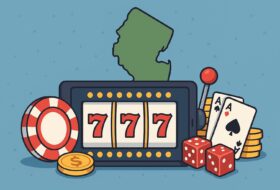
Carnival skill games and 1980s arcade classics—more and more, that’s where the gambling industry is looking for inspiration. For all their talk of innovation, real-money gaming companies seem to prefer Hollywood’s strategy of “rebooting” the successes of past decades.
Among the new products gamblers can look forward to in the next year or two: Adaptations of Atari and Taito favorites for the Skillz platform and toy crane-slot machine hybrids coming to the retail casino floor. The companies responsible for these concepts were recently profiled on CDC Gaming Reports. However, both form part of a larger trend.
High-income Millennials are now the largest audience for gambling in the US. It’s a paradoxical demographic to cater to, however. On the one hand, the perception is that many Millennials disdain traditional gambling and want something fresh and just for them. On the other, like anyone else, they’re reluctant to risk real money on something truly new unless it’s extremely straightforward to understand.
At the same time, it’s a generation that grew up on video games—perhaps even more than TV—and expects to be actively engaged in its entertainment. Yet, combining skill with gambling brings additional challenges. Gambling companies don’t really want their games to be beatable, nor do weaker players like subsidizing the play of better ones. One of the reasons online poker has been on the decline for the past 15 years is that skilled players have created an inhospitable environment for recreational ones.
So, perhaps a paradoxical problem demands a paradoxical solution. Game developers are attempting to move forward by looking backward.
Next Gaming: ‘Slotified’ Arcade Games & Skillz
Atari and Taito were two of the biggest names in arcade gaming in the 1980s. Atari was responsible for the likes of Centipede and Missile Command, while Taito brought us Arkanoid and Bust-a-Move. Although those games came out before most Millennials would have been visiting arcades, their mechanics influenced countless other games of the 8- and 16-bit eras.
Next Gaming has worked with those companies to create real money adaptations of them. Its first efforts were cabinet-based products for retail casinos, combining a for-fun skill layer with a chance-based gambling product. In its Arkanoid adaptation, for instance, the player can compete for a high score in much the same way as the original, yet each time the ball strikes a block, it’s accompanied by a small gambling transaction that could result in a win or a loss.
Its next generation of products will adapt many of the same titles for the Skillz mobile gaming platform. Unlike the retail machines, these will use the games’ skill elements as the basis for awarding prizes. Players will compete against one another in tournaments using an abbreviated version of the arcade game experience. Skillz removes the luck factor from its games by ensuring that all players in a contest receive the same setup. For instance, in its solitaire titles, each player gets the same series of cards to work with. In Next’s Skillz adaptation of Bust-a-Move, players will presumably get the same sequence of colored bubbles to shoot.
Aries Technology: Skill Bundled With Slots
Aries Technology, meanwhile, is looking at a different type of arcade games. Its focus is on the sort of mechanical devices that most commonly dispense novelties or tickets redeemable for small prizes.
It isn’t the only company that sees the potential there. The amusement chain Dave & Busters controversially partnered with Lucra Sports to develop an app for peer-to-peer wagering on games like skeeball.
Aries’ plan is different, however. It holds a patent for hybrid devices that amount to a mechanical skill game with a slot machine built in.
In other words, somewhat like Next Gaming’s cabinet adaptations, Aries has kept the skill component separate from the gambling. The player can test their skill on a coin-pusher table or toy claw machine while simultaneously participating in a game of chance, like bingo or the spin of slot machine reels. Only the latter offers cash prizes.
Aries told CDC that the rollout of its bingo-based games at Class II tribal casinos in the US met with great results, increasing play time and bringing new players into the casinos. Its plan is now to release the more slot-like versions of the games for Class III commercial casinos in 2025 or 2026, depending on how quickly it can get regulatory approval.
Repackaging Nostalgia to Solve the Paradox
There are a lot of similarities between the solutions companies like Skillz, Next, and Aries are landing on. Looking back to the early days of arcade and console gaming is only one aspect of that.
Firstly, nostalgia-based hybrid products cut through the paradox of innovation vs. familiarity. On the one hand, these games differ in important ways from other casino games and from the arcade originals. At the same time, their functioning is instantly familiar—and, more importantly, comforting—to anyone who grew up in the 1980s or 1990s.
Targeting that time window also makes it clear that these are games for Gen X and Millennial gamblers. They’re decidedly not the same tired slot themes that many of those generations feel are geared more toward their parents. Furthermore, nostalgia is particularly trendy among Millennials who’ve grown weary of social media and other more recent developments and feel that the world took a wrong turn somewhere around the year 2000.
Next Gaming’s first generation of products also landed on a similar solution to the skill gaming problem as Aries. Rather than “skill-based gambling,” these products are “skill gaming plus gambling.” Keeping those things in parallel allows the player to be actively engaged without penalizing mistakes with a lower RTP.
For its part, Skillz and similar companies resolve the problem in a different way. Like poker, they pit players against one another. However, unlike traditional poker rooms, they don’t allow players to pick their own opponents. These modern mobile skill platforms use matchmaking technology to pair players of similar ability. Professional gamblers might disdain that solution because it makes it hard—if not impossible—to profit over the long term. By the same token, however, it means that player seeking entertainment will get more mileage for their dollar.





